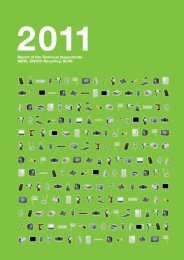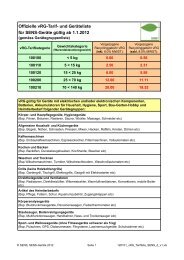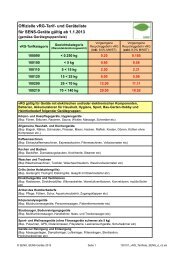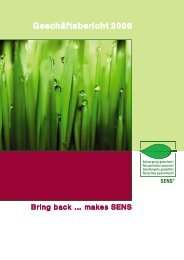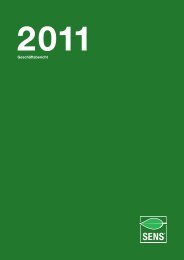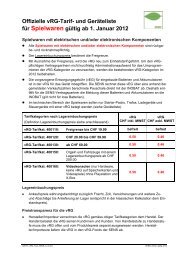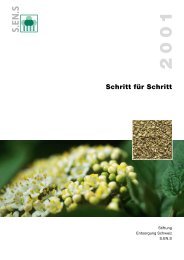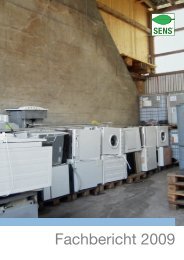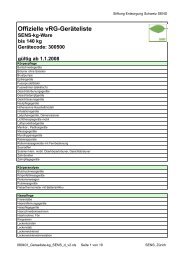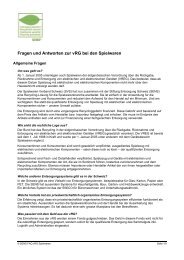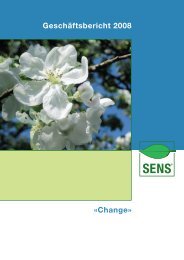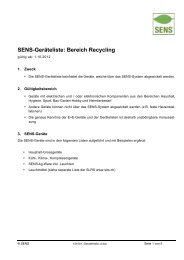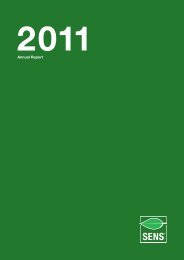Annual Report 2010 - Sens
Annual Report 2010 - Sens
Annual Report 2010 - Sens
Create successful ePaper yourself
Turn your PDF publications into a flip-book with our unique Google optimized e-Paper software.
Contents<br />
Editorial 3 e-Recycling activities 4 New B2B solution for medical devices 5<br />
SENS’s 20th anniversary celebrations 6 Third WEEE Forum conference in Zurich 7<br />
Recycling companies’ meeting 8 Trends in the prices of materials 9 e-Recycling Roadshow 11<br />
Increase in the ARF 11 Cost structure of the SENS collection points 12<br />
Revision of the VREG / ORAREEA 13 ARF fund development 14 Balance sheet 17<br />
Audit report 18 <strong>Annual</strong> <strong>Report</strong>19 SENS internal 20 Partner 22 Thanks 27<br />
Editorial<br />
Swiss take-back systems are “best in class”<br />
SENS operates the oldest take-back system for<br />
electrical and electronic appliances which is consistently<br />
based on the principle of “producer and retailer<br />
responsibility”. This is the case Europe-wide at least<br />
and possibly even worldwide. Together with SWICO<br />
and SLRS, SENS has managed to persuade producers<br />
and importers that producer responsibility is the<br />
correct principle to adopt. It didn’t do so with words,<br />
but rather with a convincing and efficient take-back<br />
system which meets the needs of industry and commerce<br />
to optimum effect. The Swiss take-back system<br />
ranks alongside its Swedish and Norwegian<br />
counterparts as the “best in class” in Europe. Switzerland<br />
is also the only country in Europe in which the<br />
responsibility for financing take-back and recycling<br />
rests completely with private enterprise.<br />
Our representatives from the BAFU (Department of<br />
the Environment, Transport, Energy and Communications)<br />
take great pride in presenting the Ordinance on<br />
the Return and Recycling of Electrical and Electronic<br />
Appliances (VREG) at international congresses. Compared<br />
especially with the extensive and often complicated<br />
legal regulations which are in force in the member<br />
states of the EU, the VREG has repeatedly set<br />
down markers in the implementation of WEEE directives<br />
at national level thanks to the clarity and brevity<br />
of the Ordinance, which is only eight pages long.<br />
Despite its success, the BAFU is in the process of<br />
revising the VREG ordinance. The current regulation<br />
still makes it too easy for companies which are not<br />
affiliated to any of the three take-back systems to<br />
refuse to pay the ARF because they are not under<br />
any legal obligation to do so. The revision is designed<br />
to prevent the successful private-sector approach<br />
being compromised because of a refusal by<br />
the minority to cooperate. After all, everyone would<br />
be disadvantaged by the alternative of a state solution<br />
which would be more costly and less flexible.<br />
Along with SWICO and SLRS, SENS monitors this<br />
process within the “VREG monitoring group”, in<br />
which all the affected stakeholder groups are represented.<br />
We will do our utmost to ensure that the<br />
great advantages of the current private-sector approach<br />
can be implemented in a new VREG ordinance.<br />
I am delighted to face up to these challenges together<br />
with the SENS team and the members of the<br />
Board of Trustees.<br />
Andreas Röthlisberger, President<br />
2 3



